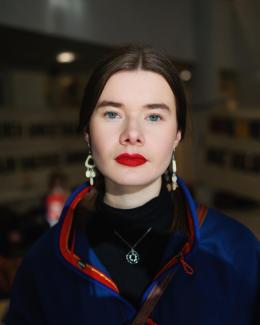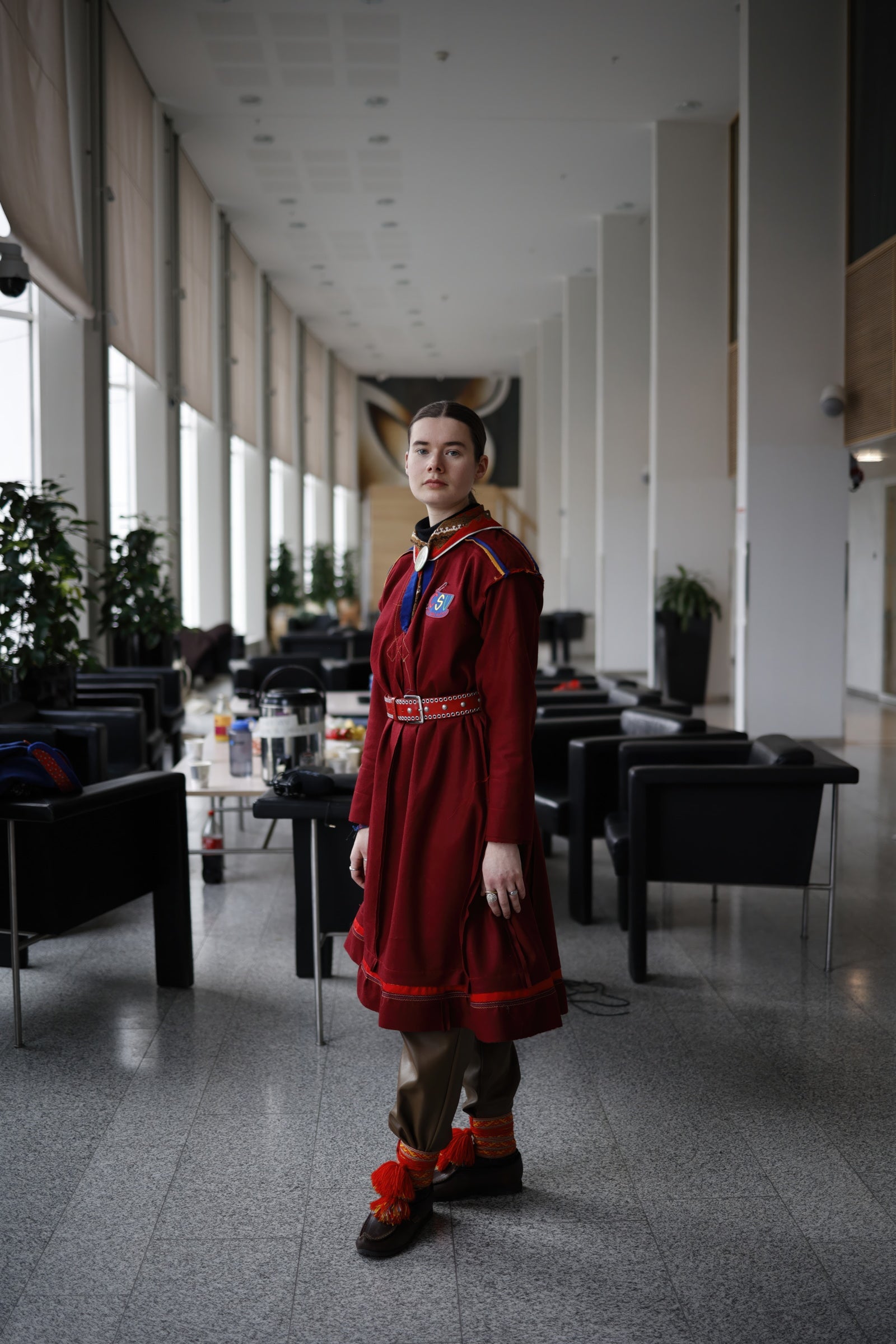
Ida Helene Benonisen (Sámi) is a Queer spoken word poet based in Oslo, Norway. Together with Asha Abdullahi, a hijabi woman, they have created a venue, Blue Monday, hosting performances, poetry nights, workshops, and other community events every month. Benonisen’s projects unite Sámi artists and artists from other minorities to reflect the power of community, unity, and understanding through universal languages.
Benonisen is Sámi, but like many others, they did not grow up in Sámi culture. They attribute this cultural loss to Norway’s assimilation politics, which, while officially terminated in the 1960s, continued to have a negative impact on their grandparent’s generation. “My grandparents are the age of the people that were taken away from their families and forced into schools to be assimilated. [My family] lost our language a generation ago, and I grew up in a family where the shame of being Sámi was strong. This is not a unique story. It is common for Sámi people that being Sámi is a family secret...because it was the only way to survive for a lot of families,” Benonisen says.
The journey of turning shame into pride and claiming their Sámi identity has been a long struggle for Benonisen. “Because of the shame in my family, I have always felt this huge void within me because I knew I was missing something. I knew I wanted to speak my language and that I wanted to connect with my culture, that I wanted to know who I was. I did not get a sense of pride until later on in life; I only started connecting with my Sámi family in my early 20s,” Benonisen says and explains how they were not alone on this journey. “I like to see it as if it were my ancestor’s whispers that were so strong that they reached me. It came to a point where I didn’t feel like I had a choice anymore. I had to be allowed to know who I was. I had to make this silence into screams. I had to speak the words that were only being whispered.”
Poetry and storytelling are intrinsic parts of Sámi culture, and to Benonisen, a key reason that their culture survived assimilation efforts—the Sámi never stopped telling stories. “The closer I came to finding myself and coming back to my culture, it was natural for me to bring my art with me,” they explain. “I explore the identity and shame part of my journey in my poetry. I was given a voice in the Sami community because of my poetry. It was very natural for me to use my poetry as a platform to talk about how it feels to be like I am a result of a very successful assimilation policy, [that] I became what the government wanted me to be. I use my platform to talk about the grief and heartbreak and everything that comes along with being assimilated because I feel like they stole so much from me.”
One of Benonisen’s favorite poems is about the beginning of becoming themself. “It’s about an animal in a cage that looks like nature, and how it is a part of creating the solution for it lives within the solution itself. It is easier to live inside of this solution than breaking down the walls of the cage. For the people watching the animal, it is much more comfortable to watch a wild animal within a cage than in the real world.” Benonisen says this poem summarizes their journey of claiming their true identity: “I had to break down those walls to become who I am. I am not supposed to be living within this illusion of being free when I am not.”
Benonisen’s fight against shame and assimilation differs from the racism experienced by Sámi people who have grown up within Sámi culture, and Benonisen says they feel privileged to have been free from that. “But the thing about being Sámi, whether you are born into it or if you have been assimilated, no matter what, it is a fight,” Benonisen says as they talk about the projects they have created with other Sámi artists. “I like how our voices can coexist in the same pieces, how we speak to each other and how we speak together about what the government did to us. They are different experiences, but within the same system...I think it is good that I can use my voice to talk about my perspective on things,” they explain.
 Ida Helene Benonisen (Sámi). Photo: Rasmus Berg.
Ida Helene Benonisen (Sámi). Photo: Rasmus Berg.
The idea of different struggles coexisting forms the foundation for the creative venue Benonisen and Abdullahi have run for the past two years. “[We have] created a space where all kinds of minorities can feel welcome, where they can come and share and perform their experiences. As an Indigenous group, it is so important that we work together with other ethnic minorities because we live in a racist system. I think that working together against that system and sharing experiences makes us stronger. I like to believe that [our venue] is a safe space for minorities of different backgrounds,” says Benonisen.
As Benonisen grew engaged in activism, it became a natural evolution for them to use poetry as an outlet for their activism. Activism is not simply about protesting, but about making people understand intersecting experiences of oppressive systems. “It is important to me to use my poetry to explain how racism affects us also as white-skinned people within different spaces and to create a more united antiracist front in Norway. I use my poetry to try and make people understand certain experiences,” they say. Poetry has become a political tool to Benonisen, a development that has helped them to “become more confident in that [I] can write good poetry on the spot and use the resources within [myself] to express [experiences of oppression],” Benonisen says.
Benonisen considers the invisibility of the Sámi as a central struggle: “We are people with strong roots, a lot of pride and resilience, but when you look like the colonizer, it is easy to disappear. As a white Indigenous group, we feel invisible to the majority a lot of the time.” This invisibility makes possible the racism experienced among Sámi, internalized or externalized, the land dispossession, and the shame. “People don’t believe us. Kids today are learning in school about the Sámi like we are some mythical creature that once existed. We are not visible, and that makes it easy for people to ignore our struggles. It makes it easier for the government to continue discriminating against us. I believe that the assimilation politics are still very much alive,” Benosisen says while appreciating and acknowledging the privilege attached to having white skin despite experiencing discrimination towards their Sámi identity.
Poetry is not just a personal outlet for Benonisen to navigate their journey from shame to claiming Sámi identity with pride. It has also become a powerful political tool to make the majority understand oppressive systems and their detrimental effects on those it oppresses. “[Poetry] is an outlet for my frustration. I carry so many emotions: I am angry, I am upset. I feel a lot of love for my culture, for the Sámi people and our allies. All these feelings of anger, sadness, love, community—poetry is the way I know how to express those feelings.”
Spoken word poetry makes the invisible visible. It is a universal language where, Benosisen says, “I can speak a language that people do not understand and they will still feel something, the energy. They can read my body language. Spoken word is more than just words. It is your body. It is the feelings, the soul, it is the level you are speaking. You make people hear and see you. They can look away but they are still going to hear me. They can close their ears, and they will still see me.”
We ARE
By Ida Helene Benonisen
We are
Children of the mighty sun itself
We are
The joik that fills the gaps between
Nordland’s trees
We are summer nights
in the midnight sun
We are the circle in the flag where
red meets blue
We are tough against the soft
Where the sea crashes against the
sheer mountain
We have treaded terrain unknown
to others
We are the song and the circle that
never shatters
We are past and present
We are Elsa Laula Renberg
We are Ella Marie Hætta Isaksen
We are fighting spirit and love
We are toil and mercy
We are hope and we are sorrow
So we know we are able to face tomorrow
And sometimes you don’t see us
But we are
We are
We ARE
And today we fill the north, south,
west, and east
With red, blue, yellow, and green
And we are
Because of those who carried on
Even after you gave them deep
deep scars
For the greatest of all
is the unity we hold
tight between our palms, between
folded hands and praying hands
And today we remember
All we are
And all we long for
We are strong
And the children of mighty sun itself
And we are
We are
We are
Right where we belong
